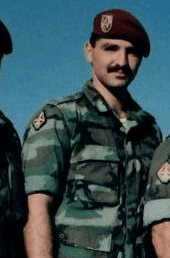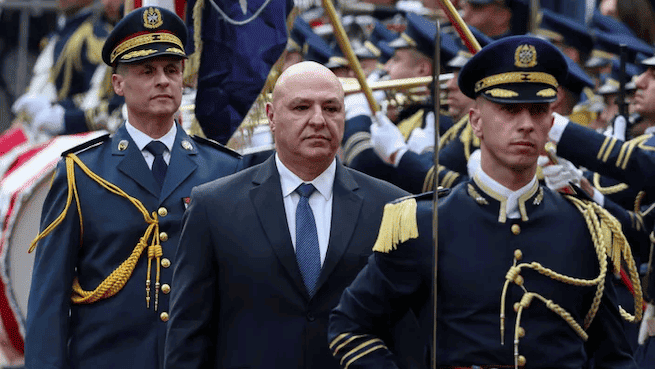|
إستماع
Getting your Trinity Audio player ready...
|
BEIRUT (AP) — Lebanon’s new president and former army commander Joseph Aoun has maintained a low profile. Those who know him say he is no-nonsense, kind and averse to affiliating himself with any party or even expressing a political opinion — a rarity for someone in Lebanon’s fractured, transactional political system.
Bilal Saab, a former Pentagon official who is now senior managing director of the TRENDS US consulting firm, often met Aoun while overseeing Washington’s security cooperation in the Middle East. He called Aoun a “very sweet man, very compassionate, very warm” who avoided political discussions “like the plague.”
“He really was viciously nonpartisan, did not have any interest in even delivering speeches or doing media,” Saab said. “He wanted to take care of business, and his only order of business was commanding the Lebanese army.”
That might make Aoun an odd fit as Lebanon’s president after being elected Thursday — ending a more than two-year vacuum in the post — but Saab said it could be a boon for the country where incoming leaders typically demand that certain plum positions go to supporters.
“He’s not going to ask for equities in politics that typically any other president would do,” Saab said.
Aoun, 61, is from Aichiye, a Christian village in Jezzine province, southern Lebanon. He joined the army as a cadet in 1983, during Lebanon’s 15-year civil war.
George Nader, a retired brigadier general who served alongside Aoun, recalled him as keeping cool under fire.
They fought together in the battle of Adma in 1990, a fierce confrontation between the Lebanese army and the Lebanese Forces militia during the war’s final stages. Nader described it as one of the toughest battles of his career.

“The level of bloodshed was significant and I remember Joseph was steady and focused,” he said.
Aoun commanded the Lebanese army’s 9th infantry brigade before being appointed army chief in March 2017.
During his tenure as commander, he oversaw the army’s response to a series of crises, beginning with a battle to push out Islamist militants from the Islamic State group and Hayat Tahrir al-Sham, or HTS, who were then operating in eastern Lebanon near the Syrian border. The army fought in coordination with the Hezbollah militant group.
HTS in its current iteration led a lightning offensive that toppled Syrian president Bashar Assad last month and has become the de facto ruling party in Syria.
The Lebanese army navigated other challenges, including responding to mass anti-government protests in 2019, the 2020 Beirut port explosion and the 14-month conflict between Israel and Hezbollah that came to a halt with a ceasefire agreement in November.
The Lebanese military largely stayed on the sidelines in the Israel-Hezbollah war, only returning fire a handful of times when Israeli strikes hit its positions. Dozens of soldiers were killed in airstrikes and shelling
The military also took a major hit when Lebanon’s currency collapsed beginning in 2019, reducing the monthly salary of a soldier to the equivalent of less than $100.
In a rare political statement, Aoun openly criticized the country’s leadership for its lack of action on the issue in a speech in June 2021.
“What are you waiting for? What do you plan to do? We have warned more than once of the dangers of the situation,” he said. The United States and Qatar both at one point subsidized soldiers’ salaries.
Ed Gabriel, president of the American Task Force on Lebanon, a nonprofit that aims to build stronger U.S.-Lebanon ties, said he met Aoun about seven years ago when he was taking over command of the armed forces and “immediately found him to be the best of those that we had worked with.”
He described Aoun as a “very direct guy, very honest” and a leader “who inspires loyalty by his hard work.” Those attributes helped Aoun to prevent a flood of defections during the economic crisis, when many soldiers had to resort to working second jobs, Gabriel said.
On a personal level, Gabriel described Aoun as a humble and deeply religious man. Like all Lebanese presidents and army commanders under Lebanon’s sectarian power-sharing system, Aoun is a Maronite Christian.
Aoun’s deep faith “really sets the groundwork for … his value system and his morals,” Gabriel said.
In Aoun’s hometown, residents burst into celebrations after his election, setting off fireworks, dancing in the streets and handing out sweets and glasses of whiskey.
“We are currently living in very difficult times, and he is the right person for this challenging period,” said Claire Aoun, among those celebrating. “May God guide and support him, and may he rebuild this entire nation for us.”
But Aoun’s election was not without controversy or universally supported, even among fellow Christians.
One of the most influential Christian parties in the country, the Free Patriotic Movement of former President Michel Aoun — no relation to the current president — opposed his candidacy. And the Lebanese Forces party gave him their endorsement only the night before the election.
Some have argued that Joseph Aoun’s election violated the law. The Lebanese constitution bars a sitting army commander from being elected president, though the ban has been waived multiple times. Some legislators were not happy doing it again.
Some in Lebanon also perceived Aoun’s election as the result of outside pressure — notably from the United States and Saudi Arabia — and less the result of internal consensus. Hezbollah’s war with Israel weakened the militant group, politically and militarily, and left Lebanon in need of international assistance for reconstruction, which analysts said paved the way for Aoun’s election.
Independent lawmaker Halima Kaakour argued during Thursday’s parliament session that “we cannot justify violating the constitution,” even if there was precedent. She took a swipe at countries seen as backing Aoun’s election, telling Western and Arab diplomats present, “No one should interfere in our internal affairs.”
Saab, the analyst, said painting Aoun as a puppet of Washington is unfair, although he acknowledged there’s no such thing as a Lebanese president or prime minister completely independent of foreign influence.
“The entire country is heavily penetrated and vulnerable and at the mercy of international powers,” Saab said. “But … if you were going to compare him to the leadership of Hezbollah being fully subservient to Iranian interests, then no, he’s not that guy when it comes to the Americans.

